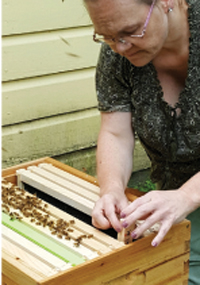Posted on Oct 31, 2017 in
LIVING THE SWEET LIFE

By Alisa Murray
www.AlisaMurray.com
Nationally recognized
portrait artist and award-
winning columnist.
To “bee” or not to “bee” – that is my question. I am assured that as my faithful readers you guys already know that I have a garden. Many years ago when we first moved into our home, there were large banana spiders weaving gorgeous webs in the trees. There were lots of ladybugs, and most importantly, there were bees, lots of bees.
If you don’t know, here’s some facts about bees. They are directly responsible for pollinating our gardens. They need to eat pollen, and their tiny feet transfer it to other plants. They are essential to the reproductive cycles of plants and flowers, and you guessed it – tomatoes and zucchinis and the whole garden. Tomato growers use a vibrator that mimics the buzzing action of the bees to stimulate the flowers so they will make fruit.

Elizabeth Hargett, my sister, tending to her hive in Richmond.
Several years ago, I noticed that the big, beautiful banana spiders were gone. Up and just disappeared in one season. Then I noticed the lady bugs were scarce, and finally for the past three years, I have really been hard pressed to find a bee a buzzing in the garden! The tomato plants would look great and make flowers and then, nothing. The zucchini and squash suffered the same fate. It was then that I began to notice in the span of a few years my garden helpers were all gone.
Pesticides that the county and neighbors with those systems sprayed had driven off if not paralyzed and chemically altered the air, making it toxic for the small animals to survive. The chemicals that are used actually genetically modify the bees and make a hot mess of the entire eco system God created for our plants, vegetables and bees to flourish. They are gone, and because they are gone, my garden is green and sterile.
Enter my sister, Elizabeth, who while in North Carolina, began bee keeping. She has maintained hives, smoked out the bees to calm them down and has as of recently moved to Richmond where the orange trees in her backyard inspired her to once again keep the bees. “Oh, the honey from these trees is going to be so fabulous!” she boasted to me recently. I told her I had not seen bees in a long, long while. I lamented that despite my best efforts to let my basil flower so they had “extra special” opportunities to pollinate, this had still left me with green tomato plants and no fruit! She assured me that her bees would survive. Well, they did not. She coaxed them, and she worked with them and despite all of her best efforts, the colony left her hive.

A bee in my basil’s flowers tasting a treat.
Meanwhile back in my part of Fort Bend County, I began watching videos on how to encourage the bees to just appear again. If my sister was a bee keeper, then I’d become a bee “helper.” Was there something, really anything that I could do to encourage these guys to just come back home and do their job? The answer was, of course, yes! Researcher after researcher stated that it is our responsibility to provide the foods that the bees need so they can provide us with their services and give us the foods that we need. We should set aside a parcel of our property, plant wildflowers and let them grow out of control! Planting clover and alfalfa helps, too. Not only will these flowers encourage the bees, but they are also food for so many others such as butterflies and ladybugs.
The answer to the initial question is we all should “bee!” Whether we are equipped with the patience to coddle a hive and become a bee keeper, or just simply become a bee helper, it is a tremendous responsibility that we all must commit to helping these wonderful creatures because they need it. You and I depend on them for real food.
The populations of bees have diminished just as the productivity has been slowly diminishing in my garden. If you need any help finding what to plant, go to Amazon, enter “flowers for bees,” and they can be delivered in a few days right to your door. Oddly enough, the timing to plant these wildflowers and clover for our area is right now. Fall in Fort Bend should always include seed-sowing of the flowers that encourage the bees to come back home!
Take Care of YOU!
Alisa
What are you doing to make your garden grow? Let me know: alisa@absolutelyfocusmedia.com.


 <
<








